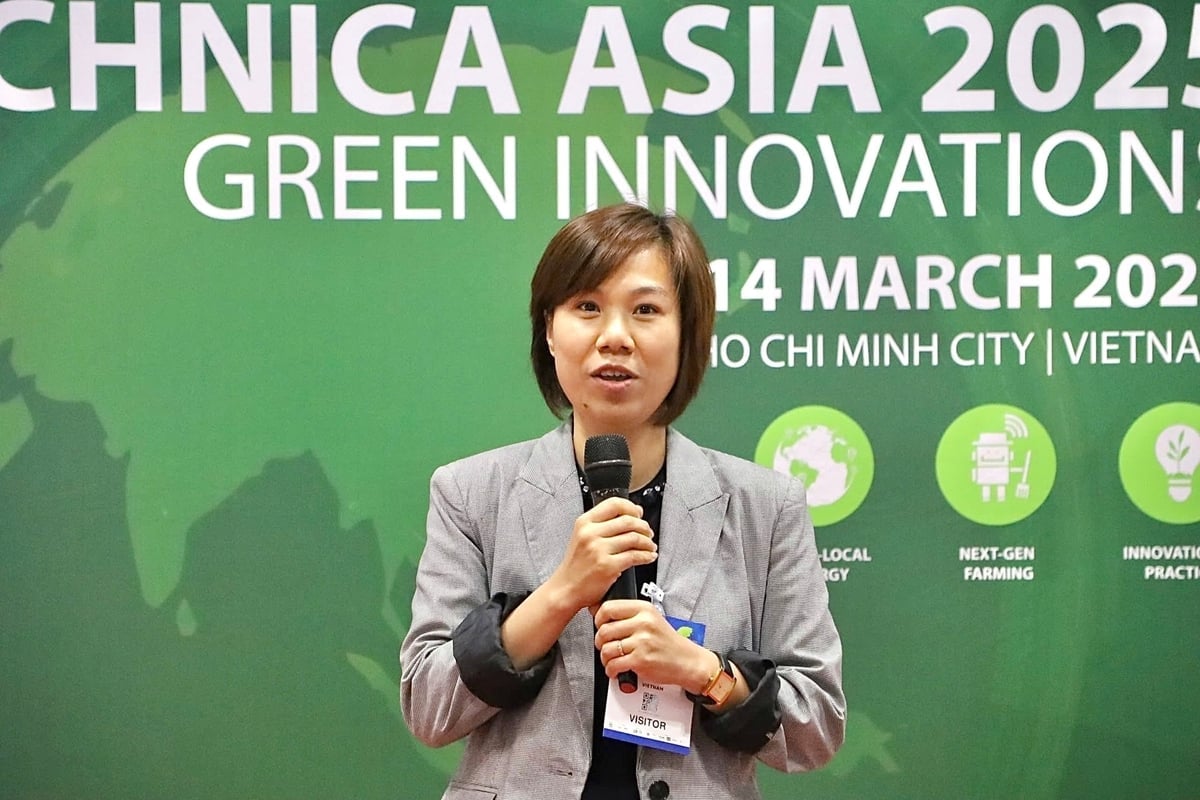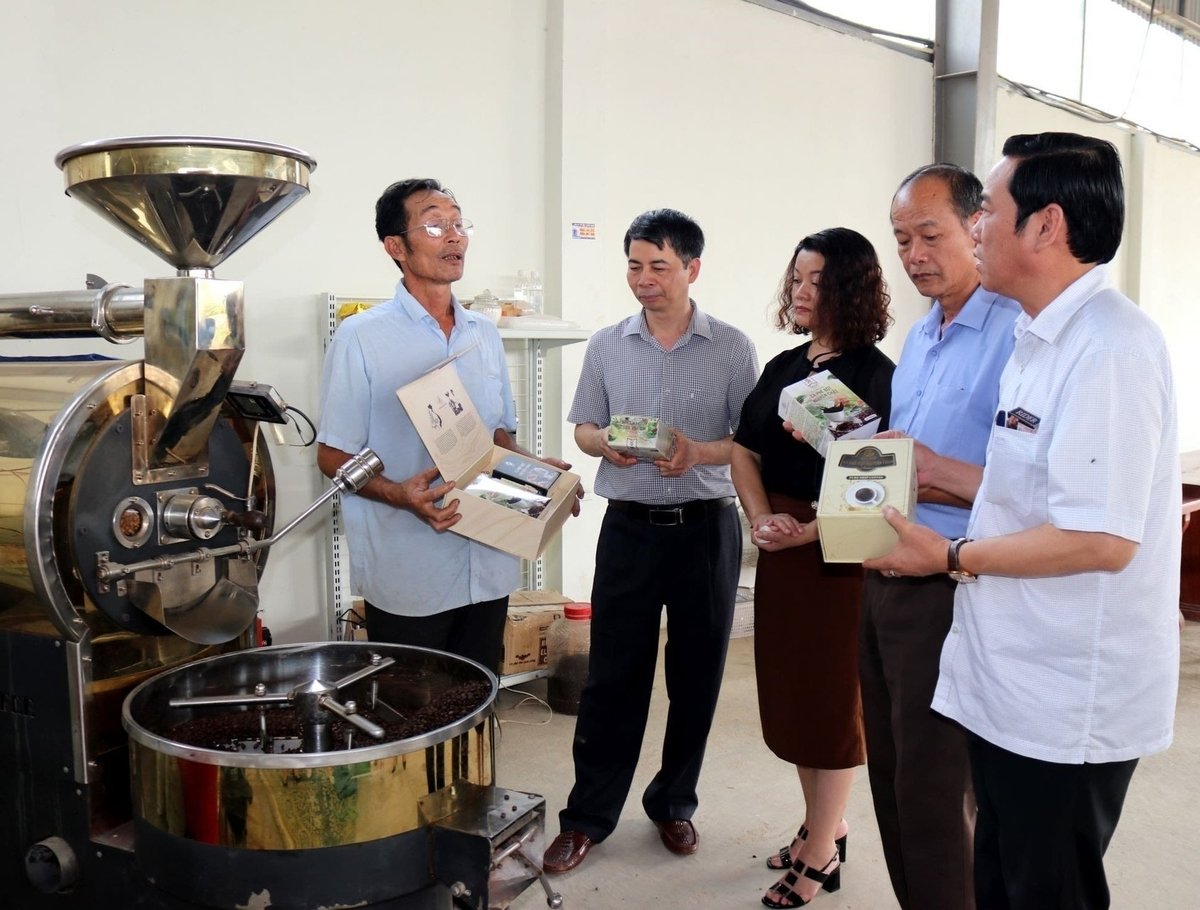June 17, 2025 | 17:27 GMT +7
June 17, 2025 | 17:27 GMT +7
Hotline: 0913.378.918
June 17, 2025 | 17:27 GMT +7
Hotline: 0913.378.918

Ms. Do Thi Thanh Huyen, technical consultant at GIZ Vietnam, speaking at the seminar. Photo: Phuong Linh.
On the afternoon of March 13, the German Cooperation Organization (GIZ) held a seminar titled "Green innovation center in agriculture and food (GIC) in Vietnam: The coffee industry", as part of the AGRITECHNICA ASIA Vietnam 2025 exhibition.
Ms. Do Thi Thanh Huyen, a technical consultant at GIZ Vietnam, mentioned that the European Union (EU) is the largest market for Vietnamese coffee, accounting for 40% of the country's total coffee production and 38% of its export turnover. She explained that under the EU's Deforestation Regulation (EUDR), coffee products being exported must meet specific criteria. These criteria require that the coffee is not associated with any deforestation activities, must comply with the laws of the country where it is produced, and provide detailed information about the geographical location of the growing regions. This regulation is aimed at ensuring that the coffee supply chain aligns with sustainable practices and protects the environment.
To support Vietnamese coffee exporters in quickly adapting, maintaining production and expanding market share, GIZ Vietnam has implemented two important projects: "Enhancing climate resilience for poor coffee-growing groups in Son La and Dien Bien (CRAS)" and "Sustainable agriculture for forest ecosystems (SAFE)".
These are two projects that support farmers and communities in adapting to climate change and protecting the environment. The CRAS project (2022-2024) was launched to help poor coffee farmers in Son La and Dien Bien improve cultivation techniques and restore production after the Covid-19 pandemic. Meanwhile, the SAFE project (2024-2028) focuses on developing sustainable agriculture in forest ecosystems, linked to the protection and restoration of natural resources. It also aims to raise community awareness about the importance of forest protection and environmentally friendly farming practices.
On the other hand, Mr. Nguyen Xuan Thao, Director of Bich Thao Coffee Cooperative, emphasized that when exporting to different markets, it is essential to adapt the coffee culture to suit the specific demands and preferences of each market.
Recognizing the growing global demand for clean and organic products, instead of coffee produced through traditional methods, Mr. Thao has shifted his focus toward producing high-quality organic coffee. He has made it a priority to actively apply modern scientific and technological advancements in the production process to improve the overall quality of the coffee. At the same time, he applies a closed-loop organic coffee production process, meeting VietGAP and UTZ standards to ensure the product’s quality for consumers.

In 2022, the coffee from Bich Thao Coffee Cooperative was certified as a 5-star OCOP product at the national level. Among them, the pure ground coffee of the cooperative was the only product from the province to make it into the Top 5-star OCOP products at the national level. Photo: Nhandan.
"In early 2021, the Bich Thao Coffee Cooperative further enhanced the value of its coffee by breaking ground on the construction of a coffee processing plant with a total area of nearly 1.120 square meters. This plant has a production capacity of 20 tons of green coffee beans per day, with a total investment of 627.000 USD. The processing line follows a fully integrated closed-loop system, which includes various advanced machines such as hulling machines, sieving machines for size and weight, color sorting machines with technology from Germany and the United States, as well as coffee roasting and grinding machines. Additionally, the facility features a storage warehouse, a display area, and a showroom for introducing their products.
Beyond the processing plant, the cooperative has also invested in the construction of three greenhouses. Two of these greenhouses are located directly behind the plant, each covering an area of 700 square meters, while the third greenhouse, located in Muong Do Commune (Phu Yen), spans an area of 1.500 square meters. Notably, the cooperative employs a wet processing method, and the coffee beans are dried in the greenhouses, making this approach more environmentally friendly", explained Mr. Thao.
In addition to these initiatives, the cooperative’s coffee trees are nourished with organic fertilizers, and the entire harvesting and post-harvest processing process is rigorously followed to preserve the natural sugar content and the inherent quality of the coffee beans. Unlike traditional methods, the de-hulling process at Bich Thao Coffee Cooperative does not use water, which helps reduce environmental impacts, aligning with sustainable and eco-friendly farming practices.
During the seminar, WeatherPlus Company introduced various technological solutions, including weather forecasting software, hydrological tools, and agricultural technologies aimed at minimizing the risks and adverse effects of climate change on the Vietnamese coffee sector. The company is also researching the digitalization of production processes, developing a suite of tools to help farmers with traceability, and creating detailed maps of coffee-growing regions with geographical indications for each farm. These innovations aim to support the coffee industry in adapting to changing environmental conditions while maintaining high-quality production standards.
Translated by Phuong Linh

(VAN) The UNESCO Global Geopark revalidation of Non nuoc Cao Bang and the transition to a two-tier administrative model are presently undergoing a pivotal moment in Cao Bang, the northernmost province of Vietnam.
/2025/06/13/5330-2-004539_953.jpg)
(VAN) Changing policy mindset and removing investment barriers are urgent requirements to open up new development space for enterprises in the agricultural sector.

(VAN) The areas include the restoration of five million hectares of marine ecosystems.

(VAN) Dr. Le Van Nguyen, Director of the Institute of E-Commerce Management (ECM), emphasizes the potential for green development through the cultivation of fruit trees, particularly in provinces such as Son La.

(VAN) VAAS and numerous Vietnamese enterprises have signed cooperation agreements with Japanese partners to promote agricultural technology and trade connectivity.
/2025/05/29/5625-12-214801_567.jpg)
(VAN) Provincial mergers in the Mekong Delta promise to streamline administration, expand inter-provincial raw material areas, and foster close linkages in agricultural value chains, benefiting both businesses and cooperatives.

(VAN) Merging Mekong Delta provinces contributes to the expansion of agricultural raw material areas, addressing previous constraints caused by provincial boundaries. Additionally, this expansion will reduce costs and strengthen linkages between businesses, cooperatives, and farmers.